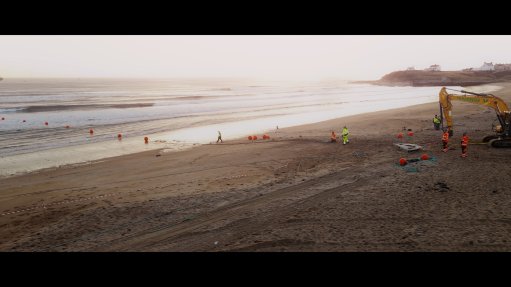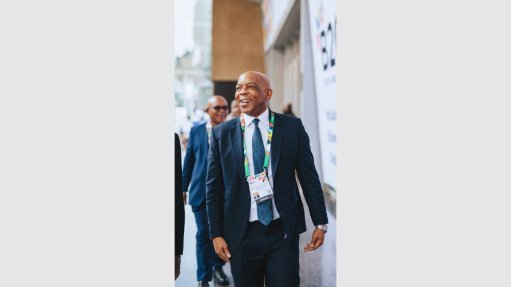Masterclass responds to rapidly changing regulatory environment


VENGAI MADZIMA The primary goal of the Masterclass is to equip participants with the knowledge required to operate effectively within Zimbabwe’s mining sector
The Zimbabwe Mining Law Masterclass 2024, hosted by research and market analyst company African Influence Exchange (AIE) last month, responded to the rapidly changing regulatory environment in Zimbabwe’s mining sector – an industry that law firm MCM Legal senior partner Vengai Madzima says remains a “cornerstone” of the nation’s economy.
With abundant mineral resources – including gold and coal – he notes that Zimbabwe holds immense potential for both local and international investors; however, leveraging this potential requires a deep understanding of the legal frameworks that govern the industry.
Madzima was one of the key speakers of the masterclass.
AIE is focused on promoting and facilitating knowledge exchange, collaboration and networking opportunities among professionals, entrepreneurs and innovators across Africa, through specialised event platforms.
According to Madzima, the motivation behind the Zimbabwe Mining Law Masterclass stemmed from the need to navigate the complexities of Zimbabwe’s regulatory landscape.
“The primary goal was to equip participants with the knowledge required to operate effectively within the country’s mining sector,” he explains, emphasising the significance of understanding the legal nuances that can impact on mining operations and investment decisions.
AIE director Erena Karsas confirms that the masterclass will be held yearly, aiming to provide continuous insight and support for industry players as they adapt to and confront new regulations and legislative challenges.
Exploring Key Regulatory Frameworks
Zimbabwe’s mining sector is governed by several key pieces of legislation, including the Mines and Minerals Act, the Environmental Management Act, and the Indigenisation and Economic Empowerment Act.
Each of these laws plays a crucial role in shaping the operational landscape for mining companies, says Madzima.
He points out that the Mines and Minerals Act is the overarching legislation for all mining activities in Zimbabwe, as it incorporates aspects of the Environmental Management Act, which prescribes environmental management processes and compliance procedures aimed at ensuring sustainable mining practices.
Specifically, the Zimbabwe Mining Law Masterclass covered essential regulatory frameworks, providing participants with a historical overview of the Mines and Minerals Act, and its amendments.
“Understanding the socio-political environment during the drafting of the original Mines and Minerals Act was crucial. “It provided context for the subsequent amendments, which were either reactive to existing conditions, or proactive in shaping the industry,” he explains.
Madzima adds that a significant portion of the masterclass was dedicated to comparing the current Mines and Minerals Act with the pending Mines and Minerals Bill, which represents the aspirations of the Zimbabwean government and various mining stakeholders.
Madzima notes that, although the Bill is still evolving, understanding its provisions is integral for planning, especially from a compliance perspective where cost implications may arise.
The Indigenisation and Economic Empowerment Act, meanwhile, has also evolved, moving from requiring full sector indigenisation to a more investor-friendly approach.
“Compliance with this Act is now reserved for specific minerals selected by the Mines and Mining Development Minister, such as diamonds and platinum. The rest of the industry remains open for unrestricted investment,” notes Madzima.
Recent Reforms
The Zimbabwean government has introduced several reforms in mining legislation aimed at enhancing transparency, accountability and sustainability.
Madzima highlights a few key changes, such as restrictions on the export of unbeneficiated base minerals without Ministerial consent.
These restrictions are designed to encourage local beneficiation, particularly in the growing lithium sector, by promoting the development of processing plants, he highlights.
In addition, Madzima explains that a special capital gains tax was imposed on the transfer of mining rights, making any transfer without payment of this tax void.
Other Masterclass Topics
The process of obtaining and maintaining mining licences and rights in Zimbabwe is central to mining operations, with the masterclass paying special attention to this topic, discussing the different types of mining licences, the procedures for obtaining them and the compliance requirements for maintaining and renewing rights.
Madzima emphasises the importance of understanding these processes, stating that “licences and rights are the cog of a mining operation”, stressing that ensuring compliance with these legal requirements is “crucial for the successful and uninterrupted operation of mining activities”.
The masterclass also addressed the challenges of risk management and dispute resolution in Zimbabwe’s mining sector.
“We took a practical approach by evaluating common disputes at the provincial level, ranging from land and water disputes to general labour issues,” highlights Madzima.
He adds that identifying the primary causes of these disputes, such as overlapping mining titles or lack of community engagement, is key to developing strategies for mitigating the occurrence thereof.
In addition, environmental compliance remains a fundamental requirement for all mining activities in Zimbabwe, with every miner needing to conduct an environmental-impact assessment of the proposed mining site before operations can start.
The masterclass also provided insights into the necessary environmental permits, pre-mining strategies for monitoring project impact, and the importance of ongoing liaison with authorities to ensure adherence to the Environmental Management Act.
Article Enquiry
Email Article
Save Article
Feedback
To advertise email advertising@creamermedia.co.za or click here
Comments
Press Office
Announcements
What's On
Subscribe to improve your user experience...
Option 1 (equivalent of R125 a month):
Receive a weekly copy of Creamer Media's Engineering News & Mining Weekly magazine
(print copy for those in South Africa and e-magazine for those outside of South Africa)
Receive daily email newsletters
Access to full search results
Access archive of magazine back copies
Access to Projects in Progress
Access to ONE Research Report of your choice in PDF format
Option 2 (equivalent of R375 a month):
All benefits from Option 1
PLUS
Access to Creamer Media's Research Channel Africa for ALL Research Reports, in PDF format, on various industrial and mining sectors
including Electricity; Water; Energy Transition; Hydrogen; Roads, Rail and Ports; Coal; Gold; Platinum; Battery Metals; etc.
Already a subscriber?
Forgotten your password?
Receive weekly copy of Creamer Media's Engineering News & Mining Weekly magazine (print copy for those in South Africa and e-magazine for those outside of South Africa)
➕
Recieve daily email newsletters
➕
Access to full search results
➕
Access archive of magazine back copies
➕
Access to Projects in Progress
➕
Access to ONE Research Report of your choice in PDF format
RESEARCH CHANNEL AFRICA
R4500 (equivalent of R375 a month)
SUBSCRIBEAll benefits from Option 1
➕
Access to Creamer Media's Research Channel Africa for ALL Research Reports on various industrial and mining sectors, in PDF format, including on:
Electricity
➕
Water
➕
Energy Transition
➕
Hydrogen
➕
Roads, Rail and Ports
➕
Coal
➕
Gold
➕
Platinum
➕
Battery Metals
➕
etc.
Receive all benefits from Option 1 or Option 2 delivered to numerous people at your company
➕
Multiple User names and Passwords for simultaneous log-ins
➕
Intranet integration access to all in your organisation



















